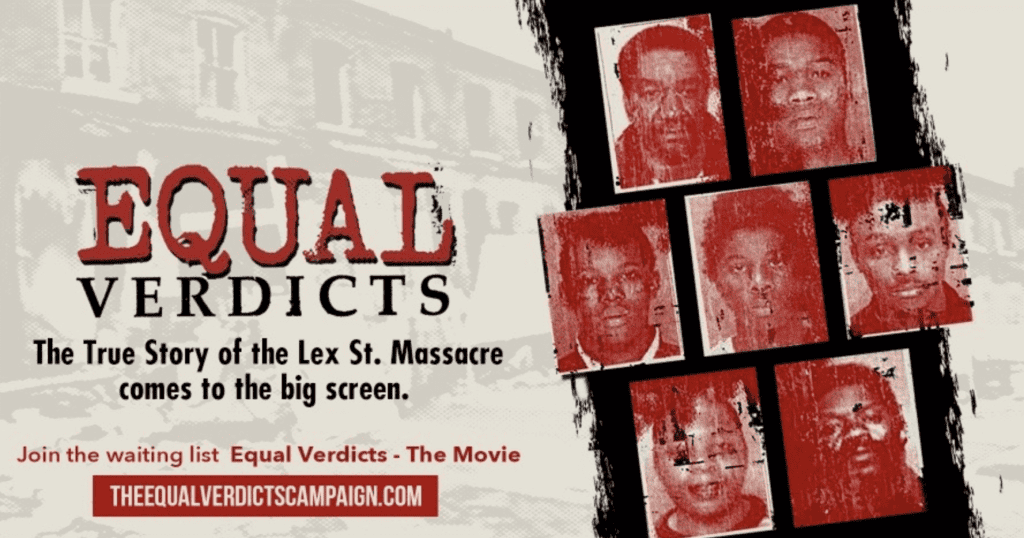
After pouring a cup of coffee each morning in South Philadelphia, Antonne Jones, an avid newspaper reader, liked to sit at his kitchen table and wade through the Daily News.
During the cold months of 2000, there was a particular case he followed in the news each day, the Lex Street Massacre, a December shooting in West Philadelphia that left seven people dead and three with major injuries.
The crime led Jones to write his 2007 book, “Equal Verdicts: The True Story of Lex Street Massacre.”
“That was about the worst mass murder to happen in the city of Philly,” Jones said.
Thirteen years later, amid a national push for diversity and inclusion in America, Jones felt it was time to dive deeper into the Lex Street stories by creating a film.
Four young men — Jermel Lewis, Sacon Youk, Hezekiah Thomas and Quiante Perrin — were accused of the murders. The Philadelphia District Attorney’s office sought the death penalty for the men, who spent 18 months in jail, but a lack of evidence resulted in the charges being dropped.
Philadelphia police charged four different men with the murders in 2002, all of whom were found guilty, after it was revealed the murders were preceded by a dispute over a car.
“I interviewed one of the killers; he did most of the killings. His name is Shihean Black,” Jones noted. “That was an experience in itself: I went there thinking this guy’s nuts, but I left actually feeling sorry for this kid.”
In Jones’ book, Black described living in the Philadelphia projects, an experience that led him to lose respect for life and its values.
The film about the massacres will dive into the lives behind the case, as well as a lawyer, a judge and the families of those charged.
“Doing those types of stories, that genre, it appealed to me because I grew up around it,” Jones explained. “I knew not to cross the line, journalistically, where it would compromise my relationship with other people that may share their story.”
While reporting the facts and keeping an unbiased perspective, Jones also wanted to write in a genre that would speak to Black men. As he wrote his novel, then screenplay, for the film, Jones was particular about his phrasing and the way he told the story so as not to glamorize the lifestyle of drugs and violence the way some films do.
“Writing was like therapy. It was therapeutic for me,” Jones noted. “I learned, at that time, I was a conflicted person. I was conflicted on a lot of my views, social views, personal views and my relationship with women.”
Jones went to Roman Catholic High School in Philadelphia, but by his junior year, he had joined the wrong crowd and found himself in trouble with the law, forcing him to drop out of school.
After an arrest in 1991 for trafficking in narcotics, Jones went back to public school and received his diploma. He then went on to pursue the track he had always wanted to: writing.
“My grandmother was a good writer, my uncle is a writer and my mom enjoys writing,” he recalled. “I didn’t realize how much I enjoyed it until I went to see a movie in 1995 called “Dangerous Minds” with Michelle Pfeiffer, and I had some thoughts about the movie.”
Jones wrote an editorial on what he saw in the film as offensive and it was published in the South Philly Review.
“Once it was published, I said, ‘Wow, I actually have a voice’,” Jones noted. “I enjoyed the ability to be able to share my commentary on certain issues.”
Jones decided to be an independent writer and create his own publishing company, ELDON Publishing. That’s how he released his first novel, 1999’s “The Family: A Philadelphia Mob Story”.
The book sold more than 3.5 million copies worldwide and put Jones on the map as an author. He now resides in Mt. Laurel with his wife, and the two own a small business in Haddonfield called Groovy Smoovies, a smoothie shop with a movie theater theme.
As Jones continues the prelaunch for “Equal Verdicts,” he plans to begin production in the next couple of months and have the first quarter filmed in 2022.
By the end of September, the writer hopes to secure funding of $500,000 to $700,000 for the film, which will feature key landmarks in the South Jersey and Philadelphia areas.
With the help of directors, screenwriters and a production team, Jones crafted a screenplay he feels will speak to a large audience and lead viewers to draw their own conclusion.
“When you pull up a jump shot, as soon as the ball leaves your hand, you know it’s good,” Jones said. “This script feels really good. It’s just a matter of executing.”
For more information on the release date for “Equal Verdicts,” go to https://theequalverdictscampaign.com


